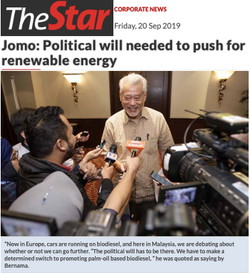- Sep 9, 2025
- 4 min read
KUALA LUMPUR, Malaysia, Sep 9 2025 (IPS) - Greenhouse gas (GHG) emissions have risen over the last two centuries, with current and accumulated emissions per capita from rich nations greatly exceeding those of the Global South.
Tropical vulnerability
The last six millennia have seen much higher ‘carrying capacities’, soil fertility, population densities, and urbanisation in the tropics than in the temperate zone.
Most of the world’s population lives in tropical and subtropical areas in developing nations, now increasingly threatened by planetary heating.
Different environments, geographies, ecologies and means affect vulnerability to planetary heating. Climate change’s effects vary considerably, especially between tropical and temperate regions.
Extreme weather events – cyclones, hurricanes, or typhoons – are generally much more severe in the tropics, which are also much more vulnerable to planetary heating.
Although they have emitted relatively less GHGs per capita, tropical developing countries must now adapt much more to planetary heating and its consequences.
Many rural livelihoods have become increasingly unviable, forcing ‘climate refugees’ to move away. Increasing numbers in the countryside have little choice but to leave.
Worse, economic and technological changes of recent decades have limited job creation in many developing countries, causing employment to fall further behind labour force growth.
Unequal development has also worsened climate injustice. Adaptation efforts are far more urgent in the tropics as planetary heating has damaged these regions much more.
Technological solutions?
While science may offer solutions, innovation has become increasingly commercialised for profit. Previously, developing countries could negotiate technology transfer agreements, but this option is becoming less available.
Strengthened intellectual property rights (IPRs) limit technology transfer, innovation, and development. The World Trade Organization (WTO) greatly increased the scope of IPRs in 1995 with its new Trade-Related Intellectual Property Rights (TRIPS) provisions.
Thus, access to technology depends increasingly on ability to pay and getting government permission, slowing climate action in the Global South. Financial constraints doubly handicap the worst off.
Despite rapidly mounting deaths due to the unprecedented COVID-19 pandemic, European governments refused to honour the West’s public health exception (PHE) concession in 2001 to restart WTO ministerial talks after the 1999 Seattle debacle.
Instead of implementing the TRIPS PHE as the pandemic quickly spread, Europeans dragged out negotiations until a poor compromise was reached years after the pandemic had been officially declared and millions had died worldwide.
With the second Trump administration withdrawing again from the World Health Organization (WHO) and cutting research funding, tropical threats will continue to dominate the WHO list of neglected diseases.
Climate finance inadequate
Citing the 2008 global financial crisis (GFC), rich nations claimed they could only afford to contribute a hundred billion dollars annually to climate finance for developing countries in line with the sustainable development principle of ‘common but differentiated responsibility’.
This hundred-billion-dollar promise was made before the 2009 Copenhagen Conference of the Parties (COP) to secure support for a significant new climate agreement after the US Senate rejected the Kyoto Protocol before the end of the 20th century.
Rich nations promised to raise their concessional climate finance contributions from 2020 after recovery from the recession following the GFC. However, official development assistance has declined while military spending pledges have risen sharply.
The rich OECD nations now claim that the hundred-billion-dollar climate finance promise has been met with some new ‘creative accounting’, including Italian government funding support for a commercial gelateria chain abroad!
In recent climate finance talks, Western governments increasingly insist that only mitigation funding should qualify as climate finance, claiming adaptation efforts do not slow planetary heating.
Meanwhile, reparations funds for ‘losses and damages’ remain embarrassingly low. Worse, in recent years, much of the West has abandoned specific promises to slow planetary heating.
Despite being among the greatest GHG emitters per capita, the USA has made the least progress. The two Trump administrations’ aggressive reversals of modest earlier US commitments have further reduced the negligible progress so far.
In late 2021, the Glasgow climate COP pledged to end coal burning for energy. But less than half a year later, the West abandoned this promise to block energy imports from Russia after it invaded Ukraine.
Concessional to commercial finance
Responding to developing countries’ demands for more financial resources on concessional terms to achieve the Sustainable Development Goals (SDGs) and address the climate crisis, World Bank president Jim Kim promoted the ‘from billions to trillions’ financing slogan.
The catchphrase was used to urge developing countries to take much more commercial loans as access to concessional finance declined and borrowing terms tightened.
With lower interest rates in the West due to unconventional monetary policies following the 2008 GFC, many developing nations increased borrowing until interest rates were sharply raised from early 2022.
Funds leaving developing countries in great haste precipitated widespread debt distress, especially in many poorer developing countries. Thus, purported market financial solutions compounded rather than mitigated the climate crisis.
Meanwhile, growing geopolitical hostilities, leading to what some consider a new Cold War, are accelerating planetary heating and further threatening tropical ecologies, rural livelihoods, and well-being.
Related IPS Articles:
Available online at: North Worsens Tropical Catastrophe

















